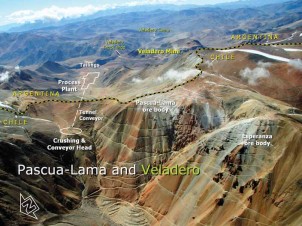
By Joan Martinez Alier.
For many years, Barrick Gold has been heavily investing in the ill-fated project of Pascua-Lama in Chile, despite the local opposition. Communities resist the destruction of glaciers in this area near the border of Argentina in the Andes and the danger this poses to the supply of water for irrigation in the Valle de Huasco. One of the main actors in this long debate has been the indigenous Diaguita community.
In 2005, Barrick managed to convince the Junta de Vigilancia de Regantes del Valle del Huasco (the local irrigation society) to accept the project, by paying them. But later on, there was an internal revolt against this decision.
Now, in April 2014, after billions of useless investment, the project is stalled. One more Grand Projet Inutile Imposé to compete with Rosia Montana in Romania and the ZAD in Nantes. The courts in Chile fined Barrick for destruction of glaciers, and the case is in the Supreme Court. The political establishment in Chile did very little to stop Barrick on time, the President of the country and the Parliament have been going round and round the issue while civil society, including the Observatorio Latinoamericano de Conflictos Ambientales (OLCA) and the courts have taken the decisive actions.
In view of the situation, in April 2014, a group of shareholders of Barrick Gold (motivated by money and not by environmental concerns) are starting a shareholders’ class action lawsuit that seeks $6-billion in damages because the company failed to disclose its problems at the Pascua-Lama mine. The action has been filed in the Ontario Superior Court of Justice in Toronto. Similar class actions suits against Barrick have been filed in U.S. federal courts. They allege that Barrick said in 2009 that construction of the mine would cost between $2.8-billion and $3-billion, eventually settling on a figure of $8.5-billion in late 2012.
There is a good chance that the permission to mine might be withdrawn altogether, ratifying the decision of a court in Chile on April 10, 2013, ordering Barrick to halt construction of the project due to environmental damages. The company announced in June 2013 that it would take losses of up to $5.5-billion related to Pascua-Lama. In October 31, 2013, the company acknowledged that it would suspend Pascua-Lama indefinitely. There have been rumors for a long time of a merger with Newmont, which itself is in trouble in the Conga project in Cajamarca, Peru, although it has invested much less money.
The shareholders’ class action alleges that Barrick misrepresented the value of its shares by failing to warn investors of the risk of failure in Pascua Lama. The class action suit in Toronto would cover investors who bought shares from May 7, 2009 (the day the company started construction of Pascua-Lama) and November 1, 2013, marking the suspension of the gold mining project.
Picture: goudeerlijk.be

The project ENVJUSTICE has received funding from the European Research Council (ERC) under the European Union’s Horizon 2020 research and innovation programme (grant agreement No. 695446)